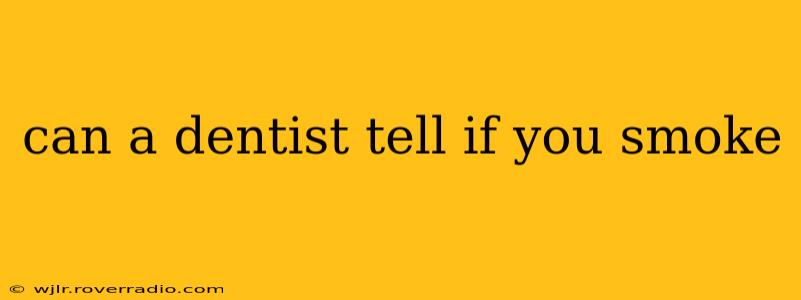Yes, a dentist can often tell if you smoke, and there are several ways they can detect it. Smoking significantly impacts oral health, leaving behind telltale signs that are easily visible during a routine dental examination. This article explores the various ways dentists identify smokers, addressing common questions and concerns.
How Can a Dentist Tell if You Smoke?
Dentists use a combination of visual observation and sometimes even smell to identify smokers. The most prominent indicators include:
-
Stained Teeth: This is perhaps the most obvious sign. Nicotine and tar in cigarettes stain teeth a yellowish-brown color, sometimes even darkening them significantly. The staining is often more pronounced on the surfaces of the teeth most exposed to smoke. While teeth whitening can lighten the stains, the underlying discoloration often remains.
-
Gum Disease (Periodontitis): Smoking significantly increases the risk of gum disease. Dentists look for signs of inflammation, bleeding gums, receding gum lines, and pockets of infection around the teeth. These conditions are often more severe and progress faster in smokers.
-
Oral Cancer Lesions: A dentist will thoroughly examine the mouth and surrounding tissues for any unusual growths, lesions, or discoloration that could indicate oral cancer. Smoking is a major risk factor for oral cancer, making this examination particularly important.
-
Halitosis (Bad Breath): The persistent smell of smoke on a patient's breath is another clear indication. While not always a definitive sign, it does contribute to the dentist's overall assessment.
-
Dry Mouth (Xerostomia): Smoking can significantly reduce saliva production, leading to dry mouth. Dry mouth increases the risk of cavities and gum disease. Dentists can identify this through observation and questioning the patient about their symptoms.
What if I Don't Want My Dentist to Know I Smoke?
While you may feel uncomfortable disclosing your smoking habits to your dentist, it's important to remember that they are there to help you maintain your oral health. Withholding information could hinder their ability to provide the best possible care and advice. Many dentists offer support and resources to help patients quit smoking.
Does Smoking Affect Dental Implants?
Yes, smoking significantly impacts the success rate of dental implants. Smoking restricts blood flow, impeding the healing process and increasing the risk of implant failure. It also increases the risk of peri-implantitis, an infection around the implant, similar to gum disease.
Can a Dentist Tell How Much You Smoke?
While a dentist can't precisely quantify the number of cigarettes smoked daily based solely on an examination, the severity of the symptoms mentioned above (staining, gum disease, etc.) can often suggest a long-term and possibly heavy smoking habit.
Can a Dentist Tell If You Smoked in the Past?
While the immediate signs like intense staining might fade over time after quitting, the long-term effects of smoking, such as gum recession or bone loss, can still be visible. Dentists may be able to infer past smoking habits from these lasting effects. Honest disclosure always leads to the best outcomes.
How Can I Improve My Oral Health If I Smoke?
Quitting smoking is the single most impactful change you can make. In addition, regular brushing, flossing, and professional dental cleanings are crucial. Your dentist can also recommend specific treatments and oral hygiene products to address the effects of smoking.
In conclusion, while a dentist may not always explicitly state "You smoke," the various visible and detectable signs mentioned above will likely lead them to suspect it. Open communication with your dentist is crucial for receiving the best possible oral healthcare, even if it involves disclosing habits you may prefer to keep private. Ultimately, your oral health benefits from transparency and a proactive approach to improving your overall wellbeing.
